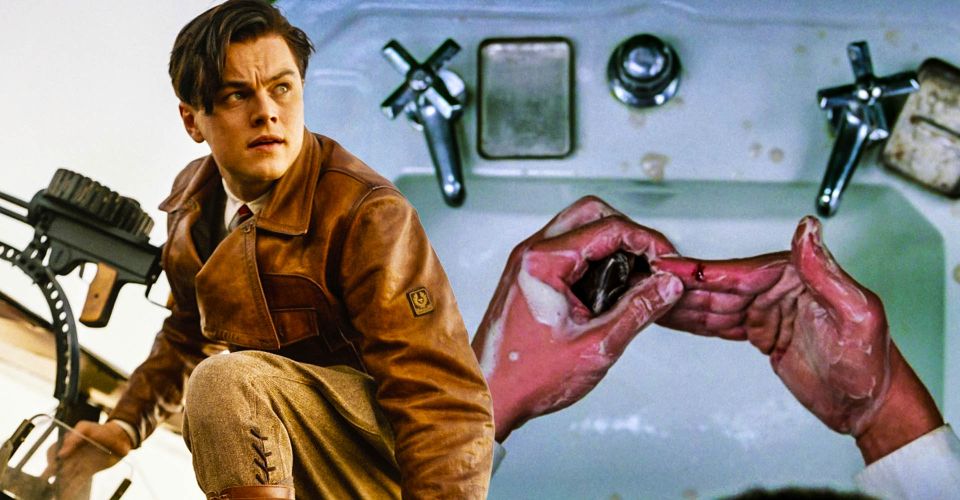The Aviator: Did Howard Hughes Really Wash His Hands That Much?

In portraying the life of the film and aviation tycoon Howard Hughes, among the most memorable scenes in The Aviator are the instances in which he washes his hands. Hughes is widely acknowledged to have had obsessive-compulsive disorder (OCD), and the 2004 film pays attention to this aspect of his life in multiple scenes and nuances. Leonardo DiCaprio’s portrayal of Howard Hughes was nominated for the Academy Award for Best Actor, but the film does make assumptions as to the specific obsessive-compulsive behavior of Hughes himself.
The biopic, directed by Martin Scorsese, primarily focuses on Hughes’ endeavors in filmmaking and aircraft design, but some scenes directly explore Hughes’ obsessive-compulsive behaviors, most notably through handwashing. Entering a public restroom, Hughes removes a personal bar of soap from a small metal tin as if skeptical of unidentifiable soaps, or perhaps resistant to the momentary dirtiness of touching a soap dispenser. A man using crutches emerges from one of the stalls and begins to wash his hands, requesting that Hughes assist him by passing him a towel. Still in the process of washing his hands, an apologetic and visually pained Hughes refuses this request. The man, rather antagonized, manages to retrieve a towel himself, while Hughes seems debilitated in a memorable aspect of Leonardo DiCaprio’s portrayal. In another public restroom, Hughes takes out his personal soap once more, washing his hands this time with excessive rigor. He stares at himself in the mirror in another pained expression, washing his hands with such aggression that he cuts his skin open. Then, having used all the towels to clean up, Hughes finds himself unable to exit the restroom. Resistant from touching the doorknob, and without a towel to avoid direct contact, Hughes waits for someone to enter so that he can leave the room in a sanitary manner.
The wide acknowledgment that Hughes had OCD and mysophobia, a fear of germs and contamination, serves to support the plausibility of such scenes in the film. The exact manifestation of Hughes’ obsessive-compulsive tendencies, however, is not entirely determinable, especially in private settings. An imaginative production, The Aviator occasionally deviates from the true story it is based on. Excessive handwashing is a common compulsion for people that have OCD. The open wound that Hughes creates on his hand in the film is an unnecessary susceptibility to contamination, but the rigorous washing that is its cause is entirely obsessive-compulsive.

Raymond D. Fowler, PhD, conducted a psychological autopsy on Hughes, that is reported by the American Psychological Association (APA). Fowler noted Hughes’ “fear of germs” and development of “obsessive-compulsive symptoms”. It is also explained that Hughes would require his staff to conduct behavior necessary to his compulsions for fear of being “contaminated from the outside.” This is portrayed in the film as Hughes asks to be presented with a bag at a 45-degree angle such that he can remove the contents without touching the bag itself. The complexities of Hughes were immense; Scorsese was not the only director interested in creating a biopic of his life, with Christopher Nolan having written an unmade script.
The extent of Hughes’ handwashing in The Aviator is plausible based on information gathered by Fowler from witness accounts, transcripts, and documents. Handwashing is certainly a behavior anticipated to resonate in a cinematic portrayal of OCD; the scenes intend to imaginatively depict the manner of Hughes’ obsessive-compulsive behavior more than represent Hughes’ life void of any fictionalization. The Aviator illuminates the form and duration of obsessive-compulsive tendencies, but the authenticity of its portrayal concerning Hughes’ specific behavior is essentially undeterminable.
The scenes of Hughes washing his hands represent an activity easily associated by the viewer with obsessive-compulsive behavior. Viewers of the film are privy to occurrences of this type of behavior without any explicit pathological determination. The film’s depiction of Hughes washing his hands is a creative interpretation, but it is nonetheless plausible and purposeful in illuminating the life of the eccentric Howard Hughes. As such, The Aviator does not serve as a documentary or diagnosis of Hughes; it portrays an interpretation of his life.
About The Author
















